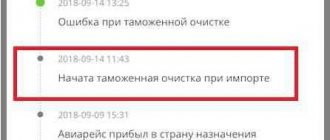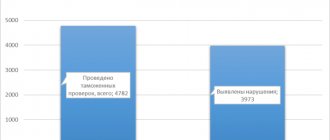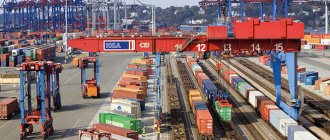When ordering various goods from China or other countries, people may experience that the order did not arrive on time. Sometimes the reason lies in a lack of goods in the seller’s warehouse or technical failures in the delivery service. But it happens that when checking the status of your parcel on the official website of the Russian Post, you can see the inscription: “The deadline for release by customs has been extended.” Such a notification appears even before the goods reach the destination country. This means that the parcel was detained by the customs service until the circumstances were clarified or the import of a particular product into Russia was generally prohibited.
Reasons for cargo delay by customs service
All orders that are imported into the Russian Federation from abroad are carefully checked and processed by customs. If, when passing through control, customs officers suspect a violation of the rules for importing goods, the parcel is temporarily delayed, and specialists begin an inspection.
What may cause the delay:
- the imported cargo contains goods that are prohibited on the territory of the Russian Federation;
- the weight of the package is more than 50 kg or is very different from that declared in the declaration;
- there are inconsistencies in the documents accompanying the order or they are missing altogether;
- the goods are imported without a declaration, and the total cost of the parcel exceeds 1,500 euros;
- too many products of the same category or group in one order.
In all these cases, the processing of the forwarded package may be suspended pending proceedings with the recipient in Russia. Parcels are also frozen at the border if the mandatory payment of customs duties is not met.
DELAYING THE RELEASE OF GOODS, HOW TO FIND THE EXTREME... (“Cargo delay” at customs)
Every importer has a vested interest in ensuring that his cargo undergoes customs clearance as quickly as possible, and that he does not have to incur unnecessary costs associated with storing cargo and renting a container.
Accordingly, the importer is interested in having a customs declaration filed as soon as possible for the arrived goods, a decision to release the goods is made by customs as soon as possible, and the goods are exported.
Why is there a “delay” of cargo at customs?
The negative consequences of quickly filing a declaration without preliminary inspection of the cargo are known to many. Senders often incorrectly indicate the weight of the goods, quantity, volume, name, or even ship someone else’s goods.
We will consider the situation in the interval between filing the declaration and its release.
An electronic declaration was submitted to one of the customs posts of the Novorossiysk customs at 12-00, and everyone is looking forward to its release, after which it will be possible to pick up the goods.
According to paragraph 1 of Article 196 of the Customs Code of the Customs Union, the decision to release goods must be made no later than 1 (one) working day following the day of registration of the customs declaration.
That is, no later than the end of the working day of the customs post at which the declaration was submitted.
The customs post carries out customs control, but we understand that no matter what forms of control are assigned by the customs authority, we are primarily interested in ensuring that the goods are released, that is, a declaration is issued.
There is a lot of cargo, there are few customs officers, and, accordingly, it is often quite problematic to carry out an inspection no later than 1 (one) working day following the day of registration of the customs declaration.
Therefore, paragraph 4 of Article 196 of the Customs Code of the Customs Union establishes that the deadline for the release of goods can be extended by the time necessary to carry out or complete forms of customs control, with the written permission of the head (chief) of the customs authority, the deputy head (chief) of the customs authority authorized by him, or persons authorized by him. their replacements, and cannot exceed 10 (ten) working days from the day following the day of registration of the customs declaration, unless otherwise established by this Code.
Part 2 of Article 220 of Federal Law-311 explains the procedure for applying paragraph 4 of Article 196 of the Labor Code of the Customs Union in the Russian Federation, and establishes exceptional cases in which the release period can be extended to 10 days.
If we briefly describe these cases in our own words, it turns out that the period for the release of goods can be extended by the declarant himself, upon his written application to extend the period for the release of goods due to the need to pay customs duties and taxes, additionally accrued in accordance with the decision of the customs authority;
Also, the release period can be extended by the customs authority itself, but until the moment the declarant fulfills the requirements of the customs authority, depending on the speed of the declarant:
– provision by the declarant of security for the payment of customs duties and taxes if the customs authority considers that such security is required during inspection activities;
– before the declarant provides additional documents required by the customs authority;
– before dividing the consignment into individual goods, if the goods presented for inspection are not divided into packaging units by individual types and (or) names of goods and (or) information about packaging and labeling is not indicated in the commercial and (or) transport documents for the goods and these circumstances do not allow the customs authorities to carry out the necessary operations to establish the conformity of the goods with information about them.
Without going into the reasons for the customs authority to make decisions to request a deposit and (or) additional documents, or to divide a consignment, it is necessary to understand that these decisions (for example, to conduct an additional inspection, order an examination, etc.) are expressed in writing and in These documents indicate what the declarant needs to do and within what time frame.
Until the request of the customs authority is fulfilled, the goods will not be released.
Therefore, before becoming indignant about the delay in the release of goods, you need to turn your attention to the existing requirements of the customs authority and the state of their implementation.
With making a deposit and submitting documents, the situation is quite transparent, you can only pay attention to the fact that the deposit is paid from funds with KBK VAT, and the size of the deposit that the customs authority will offer to make is 100% impossible to guess.
The release of goods after making a deposit in connection with checking the correctness of classification can be made no later than one day from the moment of its deposit in accordance with paragraph 10 of Article 106 of the Labor Code of the Customs Union (that is, the goods may “freeze” legally for another day).
Also, very often, a problem for both customs and the declarant is the customs inspection.
As stated above, extending the release period for goods to 10 days, in accordance with paragraph 3 of Article 196 of the Customs Code of the Customs Union, is possible only in exceptional cases, and in relation to inspection before dividing the consignment into individual goods at the request of the customs authority.
Previously, the procedure for conducting inspections was established by Order of the Federal Customs Service of April 23, 2014 No. 767 “On approval of the Temporary Instructions on the actions of customs officials when organizing and conducting customs inspections (inspections) before the release of goods.”
Without going into the provisions of this instruction, we can note that according to paragraph 3.1.5, the customs inspection report is drawn up no later than the deadline established by the customs legislation of the Customs Union and the legislation of the Russian Federation on customs for making a decision on the release of goods.
As we saw above, there are NO rules that allow extending the release date of goods solely for the reason that the customs authority did not have time to inspect the goods, the separation of which was not required.
Now the inspection procedure has been established
which are advisory and not mandatory, since they are not registered with the Ministry of Justice.
Article 201 FZ-311 the fact that the customs authority did not have time to conduct an inspection is also not considered a basis for refusing to release the goods.
The standards are quite strict, and therefore the customs authority, as a rule, seeks to relieve itself of responsibility for the fact that it was unable to complete the inspection on time and issue a customs inspection certificate.
A typical way to relieve oneself of responsibility is to trick the declarant or his forwarder into writing a letter stating that they were allegedly unable to present the goods to the customs authority for inspection, and therefore the inspection allegedly did not take place.
Such a letter is subsequently received with a bang by those considering departmental complaints about delays in release and inspection.
When considering a complaint, refusing to satisfy it, they indicate that, according to Article 108 of the Customs Code of the Customs Union, at the request of the customs authority, the declarant, warehouse owner, customs representative and other person with authority in relation to goods are obliged to transport, weigh or otherwise determine the quantity of goods, loading , unloading, reloading, correcting damaged packaging, opening packaging, packaging or repackaging of goods subject to customs control, as well as opening premises, containers and other places where such goods are or may be located.
What is understood by another person with authority in relation to goods , the customs authority, as a rule, bashfully keeps silent, but assures that the goods were not presented by you as the declarant.
It seems to us that in relation to the transshipment of cargo through the port of Novorossiysk, the only person who can perform the operations described in Article 108 of the Customs Code is the operator of the port terminal, for example OJSC NCSP or OJSC NLE, etc.
Cargo in the port of Novorossiysk is transshipped through a customs control zone (CZZ), which is created by order of the customs authority, and is not a temporary storage warehouse.
Only its owner has the right to conduct cargo operations on the territory of the control zone. Moreover, the owner of this zone bears the obligation to carry out these operations at the request of the customs authority, since it was the obligation to perform them that gave him the opportunity to create a customs control zone with the permission of the customs authority.
A situation in which the cargo is not presented for inspection at the control center, and the required operations are not performed in relation to the goods, can only occur through the fault of the owner of the control center.
The port (the owner of the port) stores cargo under an agreement with the shipping line that delivered it. The port does not have direct contracts with the declarant-importer, and is obliged to fulfill all the requirements of the customs authority, after which it requires payment of the price of services from the shipping line.
By and large, the absence of the declarant or his forwarder during inspection is not at all grounds for not conducting an inspection, since, according to paragraph 5 of Article 116 of the Customs Code of the Customs Union, the customs authority has the to conduct customs inspection in the absence of the declarant , other persons with authority in relation to goods, and their representatives if these persons fail to appear or if such persons are unknown;
If you fulfilled all the requirements of the customs authority on time, but the decision on release was not made in a timely manner, then you can challenge the inaction of the customs authority resulting in the non-release of the goods.
If someone has been fulfilling the requirements of the customs authority for a long time, then all questions should be addressed to him.
If you have been tricked into sending a letter stating that goods were not presented for inspection due to your fault, then the prospects for a departmental appeal are practically nil, and legal proceedings are quite long.
If such a letter was asked from the forwarder, then clarify why he wrote it without your consent.
WHERE and HOW TO COMPLAIN ABOUT CUSTOMS. Part 1. Appeal to a higher customs authority
If you find the strength to read this article to the end, then look at others on our website, look at the forum, and decide for yourself whether it’s worth contacting us.
If you decide, keep in mind that all oral consultations are FREE,
It’s okay that we are in Novorossiysk, if the problem has a solution, then it can be found through the waves of the ether.
We will try to answer questions asked on the forum and in the Facebook group fully and quickly.
There is already a possible answer on the forum, so first ask the question in the search bar located at the top of the forum page
We are waiting for YOU!!!
Call, write, all contacts are here
WE PROVIDE SERVICES TO LEGAL ENTITIES AND INDIVIDUAL ENTREPRENEURS (WE DO NOT WORK WITH INDIVIDUALS), INCLUDING: DECLARANTS (IMPORTERS and EXPORTERS), CUSTOMS REPRESENTATIVES, TSW OWNERS, AUTHORIZED ECONOMIC ENTITIES SKI OPERATORS, CUSTOMS CARRIERS. WE PROVIDE LEGAL SERVICES RELATED TO OPERATIONS PERFORMED WHEN MOVEMENT OF GOODS AROSS THE CUSTOMS BORDER OF THE EAEU IN THE RUSSIA REGION. WE ARE READY TO EXPLAIN THE MECHANISM OF REGULATORY REGULATION OF PROCESSES RELATED TO THE MOVEMENT OF GOODS ALONG THE BORDER, TO EVALUATE THE LEGALITY OF THE ACTIONS OF THE STATE CONTROL AUTHORITIES, TO APPEAL INDEPENDENTLY OR TO HELP YOURS RISTS ARE NOW TO APPEAL ILLEGAL ACTIONS TO HIGHER AUTHORITIES AND THE COURT.
First oral consultation is FREE (call or WhatsApp +7(906)4-313-865 ) Oral consultation – 1000 rubles Written consultation – 5000 rubles Subscription service for a month (written and oral consultations) – 15000 rubles Subscription service for a month (written and oral consultations, appealing illegal actions and decisions) – 30,000 rubles Departmental appeal (decisions on classification, customs value, preferences, application of forms of control) – 20,000 rubles Supporting an administrative investigation and preparing a complaint against a decision in a case of an administrative offense – 20 000 rubles Legal challenge (preparing a position on the case + travel expenses) – 40,000 rubles Support of customs inspection (preparing a response to a request, drawing up objections to the inspection report) – 40,000 rubles The list and price of services can be changed by agreement of the parties. The price of services does not include VAT, since the services are provided under an agreement with an individual entrepreneur using a simplified taxation system. Email WhatsApp +7(906)4-313-865
Tweet
What to do if the release date has been extended by customs
If the delay is caused by a technical failure or other problems with the logistics service, then the recipient will not be able to speed up the process of receiving his purchase. You need to wait approximately 1-3 days. If during this period the status of the parcel still has not changed, there is a reason to contact directly the seller who sent the goods.
A good option would be to call the hotline of the Federal Customs Service of the Russian Federation. If the purchase was sent by an online store through an international delivery company (EMS, IML, CDEK and others), then it is better to first call the support service of these organizations. However, such companies most often themselves notify the recipient about the delay of the parcel via SMS to the left phone number or email. The opposite situation occurs if the package was sent by Russian Post - to clarify the status, you need to contact the post office yourself.
If none of the above brings results, all that remains is to apply to the customs service. You must have with you:
- Russian passport;
- invoice from the seller;
- documents confirming payment for the order (checks);
- photo of the ordered product.
If the purchase was made for several individuals, then copies of the passports of these people must also be provided. The applicant also fills out a form on the spot, which lists all the goods in the parcel and their intended purpose. When the reason for the delay at customs is exceeding the permissible weight limit, the issue is resolved by paying the state duty.
How long to wait for the parcel
The question is ambiguous. Since there is a possibility that your parcel will not go further due to the identified violation. It is possible that the status “Extension of release date by customs, No invoice” in the parcel tracking will remain for several days, the weight of the parcel will be changed to the correct one, and the parcel will move on. You may be contacted to provide buyer details or pay customs duties.
How long it will take for it to be delivered depends on the buyer’s region. To the central part of Russia, the order can be delivered within 14-20 days . If your order is prohibited from shipping, unfortunately, it will be returned to the seller.
Open AliExpress
Storage periods for detained goods
Parcels detained at customs clearance points are temporarily left there for storage. The first 5 days are free, and subsequent days are paid by the owner of the parcel. The maximum storage period is 14 calendar days. If during this period the recipient has not contacted the customs service and provided the requested explanations, then the order is sent back to the seller.
If the package is delivered by airmail, the maximum storage period increases to 30 calendar days.
How and when to open a dispute on Aliexpress
The standard period for a detained Aliexpress parcel to remain at customs is 14 – 30 days from the date of notification of the recipient, depending on the type of postal item. After this time, the order is sent back to China. It is at the moment when the track shows that the goods are being returned that you can begin negotiations with the seller. Perhaps he will not bargain when he sees that the parcel is already on its way, and will agree to return you the full cost of the goods.
If you yourself are to blame for problems with customs, a good compromise would be to agree on a refund, minus shipping costs. Agree to this option, because if you decide to escalate the dispute, Aliexpress may take the seller’s side, and you will lose not only the goods, but also the entire amount paid for the order.
Postal rules state that until the package is delivered to the buyer, responsibility for it lies with the seller. He is obliged to look for the loss himself, resolve issues with documents, and if the client does not receive it, compensate him for the cost of the goods.
However, in the case of customs returns, everything is not so simple. If a product ordered from Aliexpress is detained at customs, the site places the burden of proof on the buyer and gives him only 7 days to do so. Moreover, a screenshot from the order is, as a rule, not enough, and when opening a dispute they are required to provide “live” documents with stamps and signatures. At the same time, a request to the customs service to receive the necessary papers can be processed up to 30 days. Therefore, before opening a dispute, visit the postal distribution point.
Be sure to take with you:
- Passport (original and copy), TIN, parcel track number.
- Copies of documents of relatives, if the order contains the same type of goods, so that customs has no doubt that the items were purchased for their personal use.
- As complete information as possible about the products: their list, photographs, links, descriptions, purpose, etc.
- Bank statement confirming payment for goods, invoices, and other financial documents.
Try to resolve all issues with customs, if necessary, pay the duty. Based on the submitted request, the government service will issue you with official papers containing the justification for the refusal of customs clearance.
As soon as you have the documents in your hands, feel free to open a dispute and be sure to attach the scans within a week.
Don’t despair if you don’t have a customs office nearby to quickly collect your documents. When you open a dispute, write to the mediators that you live in a remote place and are unable to receive an answer within the allotted time frame. Attach a screenshot from the order with your address and Google Maps, where you indicate the distance to the nearest customs office. In the parcel tracking service, take a screenshot of the information about returning the parcel to the seller. Be sure to refer to the postal convention, which obliges the sender to be responsible for the parcel until it is delivered to the buyer.
What goods are prohibited from being imported into the Russian Federation?
To avoid further problems with customs, you should know in advance that importing into Russia is prohibited by law:
- weapons, explosives and ammunition;
- alcohol;
- plants and animals;
- radioactive substances;
- narcotic substances;
- human organs;
- jewelry, antiques;
- devices for collecting information;
- non-ecological waste that threatens the environment or human health;
- Nazi-themed materials containing elements of terrorism and pornography.
If the items in the order relate to any item from the list, then it is guaranteed to be detained at the border. It is useless to wait for receipt - parcels with prohibited goods are subject to mandatory disposal. In some cases, the buyer may incur administrative or criminal liability for attempting to import prohibited goods into the territory of the Russian Federation.
“Extension of release date by customs, no invoice” - what does it mean on Aliexpress
Your order is being held by Chinese customs. “Extension of deadline” means that customs has found compelling reasons to delay the parcel. Most often, we are talking about extending the stay of the parcel with the Chinese service, and not banning its sending to Russia. However, the possibility of a ban is also present.
We list a number of reasons why questions arose when ordering from AliExpress:








